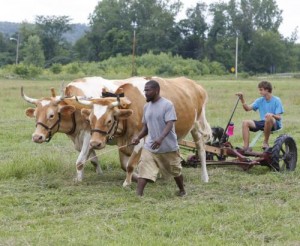For those interested in becoming involved in exploring traditional techniques and cutting edge research in sustainable agriculture should consider applying for Green Mountain College’s summer program. In its third year, the 12-credit summer intensive program Farm Life Ecology: A Field and Table Intensive, runs for 13 weeks from May 23-August 19. For the first time the College is also offering half-sessions for 6 credits from May 23-July 2 and July 7-August 19.
 “Modern agriculture is heavily reliant on fossil energy sources, and we’ll need to find ways as a society to incorporate more energy-efficient solutions to growing food,” said farm manager and program director Dr. Kenneth Mulder. “Students in this program get a chance to manage our campus farm while gaining a rigorous foundation in sustainable agriculture.”
“Modern agriculture is heavily reliant on fossil energy sources, and we’ll need to find ways as a society to incorporate more energy-efficient solutions to growing food,” said farm manager and program director Dr. Kenneth Mulder. “Students in this program get a chance to manage our campus farm while gaining a rigorous foundation in sustainable agriculture.”
Over the past three years, the college’s Farm & Food Program has received nearly $250,000 in grant funding to further develop their fossil-free agriculture initiatives.
“The Farm and Food Intensive combines a rigorous classroom experience with individual research projects and hands-on farm work,” Mulder continued. “Students also get a chance to participate in some pretty exciting research that will teach them to run farms that are productive, profitable, and environmentally sustainable.”
While in the program, students will manage all aspects of Green Mountain College’s 22-acre Cerridwen Farm while receiving a curricular focus in three core areas: the fundamentals of organic crop and animal management; efficient integration and management of diverse farm systems; and development and utilization of appropriate technologies in agriculture. In addition, their home base will be the Solar Harvest Center where the students prepare communal meals from produce they grow and harvest from the farm.
Phillip Ackerman-Leist, Director of the College’s Farm & Food Project and Associate Professor of environmental studies added, “Cerridwen Farm has become an agricultural lab of sorts, and our students contribute to that research. Like traditional ag programs students will learn a lot about agricultural practices and systems. They’ll also learn how to be part of the current food revolution that is transforming farming and how we view food.”
